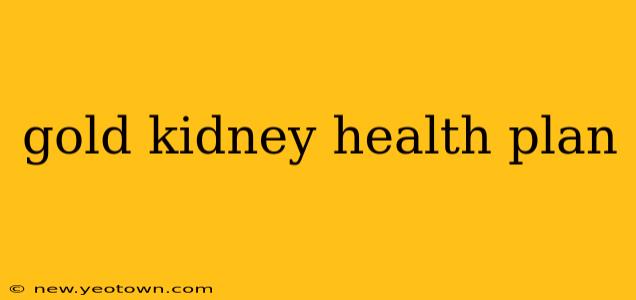Our kidneys, those unsung heroes of our internal landscape, tirelessly filter our blood, removing waste and excess fluid. But what happens when we don't give these vital organs the respect and care they deserve? Neglecting kidney health can lead to serious consequences, from chronic kidney disease to life-threatening complications. This isn't just about avoiding illness; it's about cultivating a vibrant, healthy life where your kidneys are thriving, not just surviving.
This isn't a one-size-fits-all approach. Just like gold comes in different forms – nuggets, dust, refined bars – your personalized kidney health plan needs to be tailored to your unique circumstances, medical history, and lifestyle. But there are fundamental principles, like the purest gold, that form the bedrock of any effective strategy.
What are the early signs of kidney disease?
Early kidney disease often presents with subtle symptoms, easily overlooked or mistaken for other ailments. Many individuals don't experience noticeable symptoms until the disease is advanced. This is why regular check-ups and preventative measures are crucial. Common early signs can include:
- Fatigue and weakness: Your kidneys play a significant role in red blood cell production. When they falter, fatigue becomes a common symptom.
- Changes in urination: Increased or decreased urination frequency, foamy urine, or blood in the urine can all signal kidney problems.
- Swelling: Fluid retention, manifesting as swelling in the ankles, feet, or hands, can be a sign of impaired kidney function.
- High blood pressure: Damaged kidneys struggle to regulate blood pressure, often leading to hypertension.
- Nausea and loss of appetite: Accumulation of toxins in the body due to reduced kidney function can cause digestive upset.
How can I prevent kidney disease?
Prevention is always better than cure, and with kidney health, this adage holds especially true. A proactive approach significantly reduces your risk of developing kidney disease. Key preventative strategies include:
- Managing blood sugar levels: Diabetes is a leading cause of kidney damage. Maintaining healthy blood sugar through diet, exercise, and medication (if necessary) is paramount.
- Controlling blood pressure: High blood pressure puts a strain on the kidneys. Regular monitoring and medication, if needed, are crucial.
- Maintaining a healthy weight: Obesity is linked to an increased risk of kidney disease. A balanced diet and regular exercise contribute to a healthy weight.
- Staying hydrated: Drinking plenty of water helps flush out waste products and keeps your kidneys working efficiently.
- Quitting smoking: Smoking damages blood vessels, including those in the kidneys. Quitting dramatically reduces your risk.
- Reducing salt intake: Excessive salt can increase blood pressure and strain the kidneys.
- Regular check-ups: Routine blood and urine tests can detect kidney problems early, even before symptoms appear.
What foods are good for kidney health?
Nutrition plays a pivotal role in supporting kidney function. A diet rich in fruits, vegetables, and whole grains, while limiting processed foods, is vital. Specific foods beneficial for kidney health include:
- Berries: Rich in antioxidants that protect against cellular damage.
- Leafy greens: Excellent sources of vitamins and minerals.
- Cruciferous vegetables: Such as broccoli and cauliflower, contain compounds that support kidney health.
- Garlic and onions: Possess anti-inflammatory properties.
- Fatty fish: Rich in omega-3 fatty acids, known for their anti-inflammatory benefits.
What are some lifestyle changes I can make to improve my kidney health?
Beyond diet, lifestyle changes significantly impact kidney health. These include:
- Regular exercise: Physical activity promotes overall health and aids in blood pressure and blood sugar control.
- Adequate sleep: Sufficient rest is crucial for all bodily functions, including kidney function.
- Stress management: Chronic stress can negatively impact health, increasing the risk of kidney disease.
- Limiting alcohol consumption: Excessive alcohol intake can damage the kidneys.
Can I reverse kidney damage?
The extent to which kidney damage can be reversed depends on the underlying cause and the severity of the damage. In some cases, early intervention and lifestyle changes can help slow or even reverse the progression of kidney disease. However, in advanced stages, reversal might not be possible, but further damage can be prevented. This highlights the importance of early detection and management.
This personalized "gold" standard approach to kidney health emphasizes proactive measures, lifestyle modifications, and regular medical check-ups. Remember, your kidneys are invaluable assets; treat them accordingly, and they will reward you with a healthier, more vibrant life.

